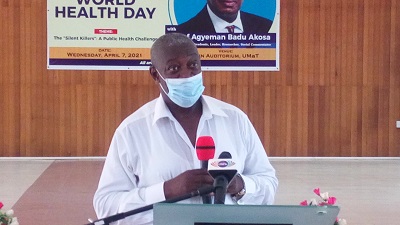
A pathologist and researcher, Prof. Agyeman Badu Akosa, has reiterated the need for public institutions and individuals to undergo regular check-ups to reduce the threats of silent killer diseases in Ghana.
He argued that such regular check-ups at least once a year, serve as a ‘reference point’ to control the upsurge of, hypertension, heart attacks and sudden deaths causing great losses to families and the society.
“These sudden deaths are reported everyday in our communities. The silent killers are preventable,” Prof. Akosa stressed when he delivered a lecture on ‘The silent killers: A public health challenge’ organised by University Teachers Association (UTAG) and the University of Mines and Technology (UMaT), Tarkwa, on Wednesday to mark the World Health Day.
The silent killers include diabetes, stroke, fibroid, and cancers.
Questioned as to whether government should legislate a policy on check-ups for institutions, he remarked “If we are waiting for government on a policy, things won’t work. There are lots institutions can do like UMaT has started. Who pays for it? They won’t do it.”
“Technological advancements have changed things– but, the bulk of the diseases we face today are preventable. We eat to live, but, some people live to eat. Eating fufu to go to bed. Lifestyles and wellness have become more important today because our world has become stressful.” Prof. Akosa said.
He suggested the need for people to have more sleep to reduce the stress each day, adding that one should sleep at least for eight hours before next day.
He said: “Sleep in very important. All these killer diseases are preventable. In 1950’s, males aged about 40, one to two were hypertensive, today, it’s about 35 per cent to 60 per cent. What has happened? If you sleep well you reduce the adrenalin. Eating too much and not sleeping well are causes of hypertension.”
The academic also said that regular exercise was good to reduce body weight because “whether we like it or not our bodies were crafted to work and so walking is reasonably important.”
“Your lifestyle is determined by the food you eat. Take more water because you dehydrate when you sweat. Who will tell me human beings are commanded to do these things, it’s your choice. Drink more water. Our bodies are made up of 70 per cent of water. Take about three liters of water daily. Lifestyle is more important.” Prof. Akosa added.
He told the gathering that carbohydrates formed about 80 per cent of the Ghanaian diet, as for example, fufu was made mainly of cassava and plantain and that the intake should be reduced to about 40 per cent.
On fats, he said that before 1910, the Ghanaian fat was mainly tropical and natural oils including coconut oil, palm oil and palm kennel oil and sheabutter, but, due to industrialisation, Ghanaian diet had shifted to seed oils including corn oil which had serious implications for the heart, stressing “ our bodies doesn’t know these oils.”
‘We have been persuaded by industrial nations that type three oils are good and so we have stopped eating butter and now gone for margarine made from seed oils. These additions do not allow the body cells to function properly.” he said.
The researcher also called for moderate consumption of meat especially at age 45 to reduce the pressure and stress on the heart and kidney.
“Again reduce your alcohol intake. Drink in moderation if at least once a week or on what I described as your feast day. For tobacco, it’s a fool who has a stick with fire at one end—you are killing yourself and slowly you are agonised to death.” Prof. Akosa warned.
He said: “Diabetes, kidney problems and hypertension are preventable and we can do something about it, especially stroke. The number of deaths is far too many. If you don’t have money, life can be terrible. Let’s have a fairer and healthier world –and we shall find the solutions to the silent killers.”
The Vice Chancellor of UMaT, Prof. Richard Amankwah said the university would organise yearly check-ups for staff on the silent killers.
FROM CLEMENT ADZEI BOYE, TARKWA







